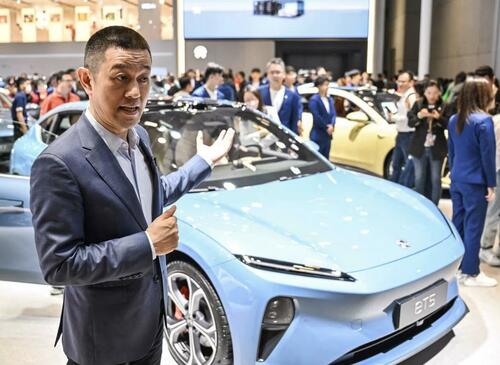
It isn't just in Europe and the U.S. where the EV industry is seeing jolting effects of Chinese EVs entering their respective markets.
It looks like the industry in Thailand has accidentally also set off chaos in their home market by offering subsidies to Chinese EV makers, a move that Nikkei Asia reports is "wreaking havoc" in Thailand.
The unintended consequences of EV subsidies have also affected supply chains, with at least a dozen parts producers shutting down as subsidized Chinese EV makers avoid buying from most of them.
Since the Thai government introduced the EV subsidy scheme in 2022, 185,029 EVs have been imported. However, new EV registrations stand at 86,043, indicating an oversupply of around 90,000 vehicles.
EVAT President Krisda Utamote, noting more Chinese EV makers are now investing in Thai production, said: "We are experiencing an EV oversupply as plenty of EVs imported from China over the past two years [remain in dealer] inventories."
The EV subsidy program, initiated in 2022 under the ASEAN-China Free Trade Agreement, aimed to make EVs more affordable by offering up to 150,000 baht ($4,130) per vehicle and eliminating tariffs on Chinese imports, provided the manufacturers produce an equivalent number in Thailand. Manufacturing was required to begin this year.
Nikkei Asia reports that BYD, China's largest EV maker, aggressively cut the price of its Atto model by 37%, while Neta reduced its V-II model price by 9%. When fully operational, Chinese EV makers in Thailand will have the capacity to produce about 750,000 vehicles annually.
These subsidies have impacted the Thai automotive sector, which employs over 750,000 workers and contributes 11% to the GDP. The automotive sector is the fourth-largest economic contributor, following tourism (18%), retail (16%), and ahead of agriculture (8.6%).
Sales of fossil fuel vehicles have declined since the subsidies, significantly affecting Japanese automakers who produce 90% of these vehicles in Thailand. Additionally, economic weaknesses have led consumers to cut back on expensive purchases, with vehicle sales in the first five months of the year down 23% from the same period in 2023, the lowest in a decade, according to the article.
Recall, we have extensively covered how the EU is attempting to tariff their way out of oversupply problems and what the Union sees as a price distortions as a result of China's contributions to the industry.
As we noted earlier this summer, SAIC is being hit with a 38.1% tariff and BYD is being hit with a 17.4% tariff, the report says. Geely Auto will face a 20% tariff and all tariffs are on top of the EU's existing 10% tariff.
EV-makers that cooperated with the probe but weren’t in the three-company sample will face an additional 21% duty, while uncooperative ones will incur the full 38.1%. European brands like Mercedes-Benz, BMW, and Renault, which export China-assembled EVs, will also face extra tariffs, according to Caixin.
China’s Ministry of Commerce criticized the decision, stating the EU ignored facts, WTO rules, and objections from China and EU member states. Beijing vowed to protect Chinese companies' rights.
It isn’t just in Europe and the U.S. where the EV industry is seeing jolting effects of Chinese EVs entering their respective markets.
It looks like the industry in Thailand has accidentally also set off chaos in their home market by offering subsidies to Chinese EV makers, a move that Nikkei Asia reports is “wreaking havoc” in Thailand.
The unintended consequences of EV subsidies have also affected supply chains, with at least a dozen parts producers shutting down as subsidized Chinese EV makers avoid buying from most of them.
Since the Thai government introduced the EV subsidy scheme in 2022, 185,029 EVs have been imported. However, new EV registrations stand at 86,043, indicating an oversupply of around 90,000 vehicles.
EVAT President Krisda Utamote, noting more Chinese EV makers are now investing in Thai production, said: “We are experiencing an EV oversupply as plenty of EVs imported from China over the past two years [remain in dealer] inventories.”
The EV subsidy program, initiated in 2022 under the ASEAN-China Free Trade Agreement, aimed to make EVs more affordable by offering up to 150,000 baht ($4,130) per vehicle and eliminating tariffs on Chinese imports, provided the manufacturers produce an equivalent number in Thailand. Manufacturing was required to begin this year.
Nikkei Asia reports that BYD, China’s largest EV maker, aggressively cut the price of its Atto model by 37%, while Neta reduced its V-II model price by 9%. When fully operational, Chinese EV makers in Thailand will have the capacity to produce about 750,000 vehicles annually.
These subsidies have impacted the Thai automotive sector, which employs over 750,000 workers and contributes 11% to the GDP. The automotive sector is the fourth-largest economic contributor, following tourism (18%), retail (16%), and ahead of agriculture (8.6%).
Sales of fossil fuel vehicles have declined since the subsidies, significantly affecting Japanese automakers who produce 90% of these vehicles in Thailand. Additionally, economic weaknesses have led consumers to cut back on expensive purchases, with vehicle sales in the first five months of the year down 23% from the same period in 2023, the lowest in a decade, according to the article.
Recall, we have extensively covered how the EU is attempting to tariff their way out of oversupply problems and what the Union sees as a price distortions as a result of China’s contributions to the industry.
As we noted earlier this summer, SAIC is being hit with a 38.1% tariff and BYD is being hit with a 17.4% tariff, the report says. Geely Auto will face a 20% tariff and all tariffs are on top of the EU’s existing 10% tariff.
EV-makers that cooperated with the probe but weren’t in the three-company sample will face an additional 21% duty, while uncooperative ones will incur the full 38.1%. European brands like Mercedes-Benz, BMW, and Renault, which export China-assembled EVs, will also face extra tariffs, according to Caixin.
China’s Ministry of Commerce criticized the decision, stating the EU ignored facts, WTO rules, and objections from China and EU member states. Beijing vowed to protect Chinese companies’ rights.
Loading…





